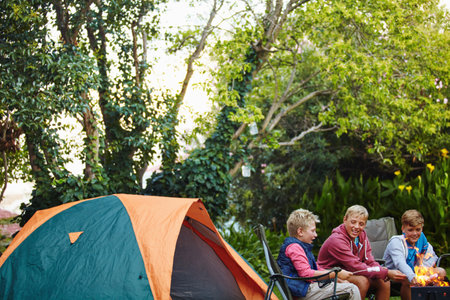Introduction to Eco-Friendly Camping in the UK
As gentle dawn mist drifts across rolling green fields and ancient woodlands, more families are discovering the joys of camping amid Britain’s breathtaking landscapes. Yet with this growing passion for the great outdoors comes a renewed responsibility—to protect these precious spaces for future generations. Across the UK, sustainable camping is blossoming into a movement, one where eco-friendly choices are woven into every adventure. Choosing greener habits on your next family camping trip isn’t simply about following trends; it’s an act of care for our countryside, from the wild Scottish Highlands to the tranquil lakes of Cumbria and the storied coastlines of Cornwall. By rethinking what we pack and how we tread, each camper can help ensure that our children and grandchildren will hear birdsong at dawn, see bluebells in spring, and find wonder under starlit skies for years to come.
Choosing Sustainable Camping Essentials
When planning an eco-friendly family camping trip in the UK, selecting sustainable essentials is key to treading lightly on the land. British campsites, with their lush green fields and unpredictable weather, call for gear that’s not only gentle on the environment but also resilient against rain, wind, and muddy terrain. Let’s explore how you can curate your kit with sustainability in mind, so every adventure leaves only footprints and cherished memories.
Eco-Conscious Tents & Sleeping Gear
Opt for tents made from recycled or organic materials. Look for brands that use PET-recycled polyester or cotton canvas treated with natural waterproofing agents—these stand up well to the British drizzle and morning dew. For sleeping bags and mats, consider those filled with recycled synthetic fibres or ethically sourced down, ensuring warmth during those brisk Lake District nights.
Bamboo & Stainless Steel: Tableware That Lasts
Ditch single-use plastics by packing bamboo plates, bowls, and cutlery, which are both lightweight and biodegradable. Stainless steel mugs and water bottles are robust companions for chilly Scottish mornings and can endure many seasons of family trips.
Table: Sustainable Gear Choices for UK Campsites
| Item | Sustainable Option | Why It’s Suited to the UK |
|---|---|---|
| Tent | PET-recycled polyester or organic cotton canvas | Waterproof, durable in wet conditions |
| Sleeping Bag | Recycled fill or ethical down | Keeps warm during cool nights |
| Plates/Cutlery | Bamboo or stainless steel | Reusable, easy to clean after a rainy day’s meal |
| Water Bottles/Flasks | Stainless steel or BPA-free recycled plastic | Keeps drinks hot or cold, robust for hikes |
| Torch/Lantern | Solar-powered or rechargeable LED | No batteries required; perfect for long stays off-grid |
Top Tip:
If you’re investing in new gear, choose items designed for repairability—spare tent poles or patch kits make all the difference when a gusty Cornish wind comes calling. This way, you reduce waste and ensure your kit stands the test of many family escapes into Britain’s wild beauty.

3. Pack Light, Pack Smart
Embarking on a family camping adventure across the UK’s rolling hills and tranquil woodlands calls for mindful preparation. One of the simplest ways to tread lightly is to pack with purpose—choosing items that serve multiple functions and are sourced locally whenever possible. Instead of overloading your car with gear you might not use, opt for versatile essentials: think a sturdy cast-iron pan that works both on a campfire and stovetop, or layered clothing suitable for unpredictable British weather. By prioritising multi-use items, you’ll not only lighten your load but also reduce waste and consumption.
Supporting Britain’s vibrant small businesses adds another layer of sustainability to your trip. Seek out locally made products—from beeswax wraps for food storage to hand-knitted blankets and reusable water bottles crafted by regional artisans. These thoughtful choices bolster local economies, reduce carbon emissions associated with long-distance shipping, and often offer better quality than mass-produced alternatives. Every purchase becomes part of the story of your adventure, connecting you more deeply to the landscapes and communities you visit.
When packing smartly, consider borrowing or renting equipment from friends, neighbours, or dedicated outdoor libraries—especially for specialist items like tents or child carriers that may only be needed occasionally. This approach not only minimises clutter at home but encourages a culture of sharing within your local area.
4. Plastic-Free and Low-Waste Strategies
In the heart of the British countryside, embracing a plastic-free and low-waste approach to camping can transform both your family’s experience and the environment you love. Choosing practical alternatives to single-use plastics not only reduces landfill waste but also adds an authentic touch to your outdoor adventures.
British Alternatives to Single-Use Plastics
| Single-Use Plastic Item | Practical British Alternative | Why It Works |
|---|---|---|
| Plastic water bottles | Reusable stainless steel or glass bottles (e.g., Chilly’s Bottles, S’well) | Keeps drinks cool, easy to refill at campsite taps, supports local brands |
| Cling film/wrap | Beeswax wraps (locally made), reusable silicone lids | Natural materials, washable, keeps food fresh without waste |
| Plastic cutlery & plates | Bamboo or stainless steel picnic sets (Wild & Stone, Joseph Joseph) | Durable, easy to clean, brings a rustic charm to meals |
| Carrier bags | Canvas or jute shopping bags (available in most UK supermarkets) | Strong for carrying supplies, reusable again and again |
| Food storage bags | Stainless steel tins, glass jars, or compostable paper bags | Reduces microplastics, easy to label and organise meals/snacks |
Clever Food Storage in the Wilds of Britain
The unpredictable weather and curious wildlife of British campsites mean clever food storage is essential. Use stackable metal containers for perishables—they’re sturdy and keep out cheeky squirrels. Wrap sandwiches in waxed cloth and store leftovers in glass jars, which are as charming as they are practical. Always keep food off the ground and stow securely overnight.
Waste Management: Leave No Trace in the Great Outdoors
Packing a dedicated waste kit makes all the difference. Bring separate compostable bin liners for recyclables, compostables, and general rubbish. Many British campsites have recycling points—check signage for local rules. Compost food scraps where permitted; otherwise, carry them home for green disposal. For those cherished cups of tea, use loose leaf instead of teabags (which often contain plastic) and pack out used leaves responsibly.
A Thoughtful Approach for Lasting Memories
The gentle rhythm of British nature rewards those who tread lightly. By swapping single-use plastics for sustainable alternatives and planning mindful waste management, your family camping trips become both eco-friendly and beautifully memorable—leaving nothing behind but laughter echoing through the trees.
5. Caring for British Nature
As you embark on your family camping adventure across the rolling hills and ancient woodlands of Britain, embracing a deep respect for nature is at the heart of an eco-friendly experience. British campsites are often nestled within areas of outstanding natural beauty or near Sites of Special Scientific Interest (SSSIs), making it essential to tread lightly and thoughtfully. Practising good camping etiquette ensures that these beloved landscapes remain unspoilt for generations to come.
Respecting Local Wildlife
The UK’s countryside teems with a quiet, wild magic: curious red squirrels in the Lake District, songbirds trilling in Sussex hedgerows, deer glimpsed at dawn in Scottish glens. When camping, observe wildlife from a respectful distance and resist the temptation to feed animals, as this can disrupt their natural behaviour and diet. Use binoculars for close-up views and keep pets under control to protect ground-nesting birds and other creatures.
‘Leave No Trace’ Principles
At the core of sustainable camping lies the ‘leave no trace’ philosophy—a simple yet profound commitment to leaving each place as you found it, or better. Take all litter home, including food scraps that might seem harmless but could harm local fauna. Avoid picking wildflowers or disturbing habitats, and use established paths to prevent soil erosion. When using campfires (if permitted), stick to designated fire pits and ensure fires are fully extinguished before you depart.
Mindful Foraging Traditions
Foraging—be it for blackberries along Cornish lanes or wild garlic by a Cumbrian stream—is a cherished part of British outdoor culture. However, responsible foraging means only taking what you need, leaving plenty for wildlife and fellow walkers. Always follow the Countryside Code: seek landowner permission where required, identify plants carefully, and avoid rare or protected species. By treading gently and mindfully, your family becomes part of a long tradition that values harmony with nature over mere consumption.
Sustainable camping on British soil is not just about what you pack but how you interact with the land itself. Through kindness to wildlife, adherence to ‘leave no trace’, and thoughtful participation in age-old customs like foraging, your family creates memories steeped in both wonder and stewardship—honouring Britain’s wild places while ensuring they thrive for years to come.
6. Eco-Conscious Activities for the Whole Family
Immersing your family in nature isn’t just about pitching a tent—it’s about creating memories that nurture both your bond and the environment. British campsites, with their patchwork meadows and ancient woodlands, offer the perfect backdrop for gentle adventures that tread lightly on the land. Embrace activities that celebrate local flora, fauna, and heritage, encouraging children and adults alike to become stewards of the countryside.
Pond Dipping: Discover Hidden Worlds
Many UK campsites have tranquil ponds or slow-flowing streams—ideal spots for pond dipping. Armed with a simple net and a clear container (avoid single-use plastics), little ones can marvel at water boatmen, tadpoles, and delicate dragonfly larvae. This hands-on exploration fosters respect for aquatic life and teaches the importance of leaving habitats undisturbed. Always release creatures gently back to their watery homes and avoid using soaps or chemicals nearby.
Hedgerow Walks: Nature’s Living Corridors
Britain’s hedgerows are brimming with life and history, weaving through farmland like leafy green veins. Set out as a family for a slow-paced hedgerow walk, identifying wildflowers, berries (only if you know they’re safe!), and listening for birdsong. Bring along a pocket-sized field guide or download a British wildlife app to help spot robins, wrens, or even elusive hedgehogs. Encourage children to sketch what they find or jot down observations in a nature journal made from recycled paper.
Storytelling Under the Stars
As dusk settles and campfires glow (where permitted), gather together for an evening of storytelling beneath the vast British sky. Share traditional folk tales from the region—perhaps tales of Cornish piskies or Scottish selkies—or invent your own adventures inspired by the day’s discoveries. Storytelling weaves together family traditions and local heritage, all without needing screens or extra resources.
Tips for Low-Impact Fun
- Use reusable containers and eco-friendly craft materials for nature-based activities.
- Avoid picking wildflowers or disturbing animal nests; observe quietly instead.
- Bring binoculars for wildlife spotting—borrow rather than buy if possible.
Cherishing Nature Together
Sustainable family camping is about more than reducing waste—it’s about fostering wonder and care for Britain’s natural treasures. By choosing mindful activities that honour the landscape, you’ll leave only footprints and take away cherished memories that last long after your tents are packed away.
7. Final Thoughts: Creating Lasting Green Memories
As your family adventure draws to a close, take a moment to reflect on the gentle imprint you’ve left behind—one that’s harmonious with the rolling hills, ancient woodlands, and wild coastlines of Britain. Choosing sustainable packing isn’t just about reducing waste; it’s about nurturing a mindful relationship with nature and weaving these values into the fabric of your family’s camping traditions. Each reusable water bottle refilled at a crystal-clear stream, every carefully sorted recycling bag, and all those thoughtful, local food choices become part of the story you share together under the open sky. By embracing eco-friendly habits on British campsites, you’re not only preserving the landscapes for future generations but also deepening your children’s connection to the living history and beauty of the land. Let your family’s camping memories be coloured by care—where laughter rings out beneath ancient oaks and curiosity leads little feet along dew-dappled trails, always treading lightly. As you pack away your gear and leave no trace behind, carry home the lesson that adventure and stewardship go hand in hand. In this way, every trip becomes an invitation to love and protect our treasured wild places—a promise for tomorrow stitched into today’s joyful explorations.


